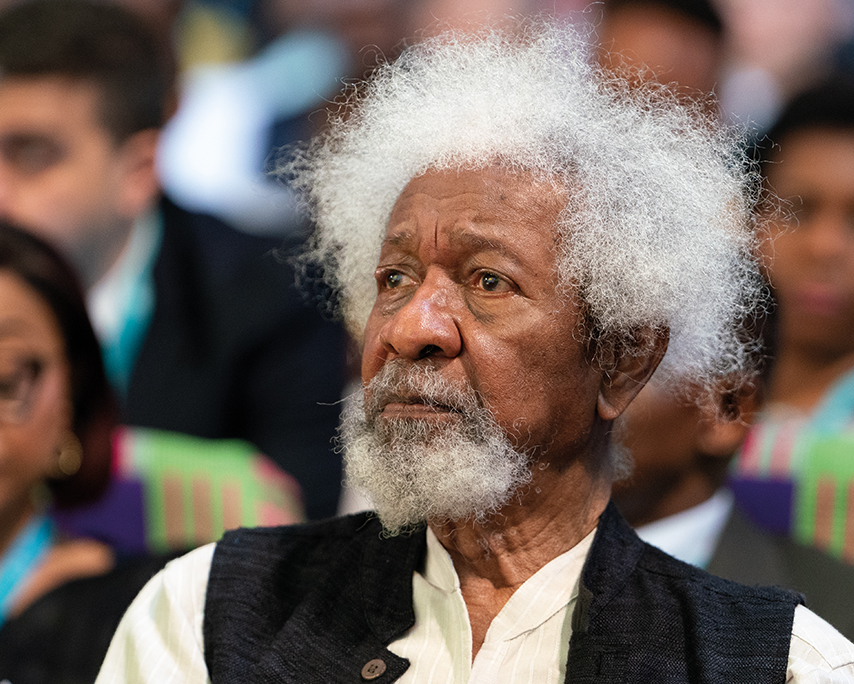Professor Wole Soyinka, Nigerian Playwright and Essayist, Nobel Laureate in Literature, at the African Export-Import Bank (Afreximbank) Annual Meeting in 2023 at the Accra International Conference Center in Accra, Ghana. The event is to mark the high point of the bank’s year-long 30th-anniversary celebrations, under the theme “Delivering the Vision. Building Prosperity for Africans”.
Photo Credit: Ernest Ankomah/Getty Images
International Day for Universal Access to Information
The power of information access in Africa’s growth
Africa is not short of knowledge. Across the continent, universities, research institutions, government agencies, and development organisations generate vast amounts of data and expertise every year. From studies on climate change and agriculture to insights on urban planning, health, and trade, Africa is rich with information. However, much of this knowledge is underutilised. It is often published in obscure journals, retained within academic silos, or, worse still, not published at all. Valuable findings risk gathering dust instead of informing policy, shaping practice, or contributing to continental progress.
The challenge of distribution
One of the biggest barriers is the fragmented way information is produced and shared. A report produced in Nairobi may never reach policymakers in Dakar. A groundbreaking agricultural study in Accra might sit behind a paywall, accessible only to a small academic audience. In other cases, data remains unpublished due to a lack of resources or institutional support, leaving communities and decision-makers without evidence that could directly benefit them.
This fragmented distribution undermines not only national development but also Africa’s ability to integrate as a continent. Cross-border cooperation relies on access to shared knowledge, whether it is trade statistics, environmental research, or public health data. Without accessible information systems, Africa risks duplication of effort, missed opportunities for innovation, and slower responses to urgent challenges.
Why cross-border access matters
The African Continental Free Trade Area (AfCFTA), for example, relies heavily on timely and transparent information flows across borders. Traders, regulators, and investors need accurate data to make decisions. Similarly, regional security, climate resilience, and health responses all depend on information that does not stop at national borders. Comprehensive and cross-border access to knowledge is therefore not just a technical issue but a continental priority.
Moreover, Africa’s diversity means that many solutions are context-specific. Sharing experiences across borders allows countries to learn from one another. For instance, an effective waste management model in Kigali could inform approaches in Lagos; a successful digital health innovation in Cape Town could be adapted in Lusaka. When knowledge is accessible, Africa benefits collectively.
Beyond cross-border cooperation lies the broader principle of universal access. Information is not only for policymakers and academics; it should be accessible to citizens, communities, and businesses. Universal access democratises knowledge, giving ordinary people the tools to make informed decisions about their health, livelihoods, and rights. It also nurtures innovation at the grassroots level, where some of Africa’s most creative and practical solutions emerge.
Enhancing access to information in Africa requires deliberate effort and long-term commitment. Such efforts involve building open data platforms that are easy to use and designed with regional needs in mind. It also means encouraging institutions to move beyond publishing in specialised academic journals and to make their findings available in formats that are accessible to wider audiences, from policymakers to community organisations. Regional knowledge hubs can play a central role here, collecting, translating, and disseminating research so that it reaches across linguistic and geographic boundaries. Just as important is the need for strong policies that mandate transparency and openness, ensuring that valuable data does not remain locked behind closed doors, while at the same time protecting sensitive information.
Ultimately, universal and cross-border access to information is about more than data management. It is about equity, empowerment, and continental integration. By ensuring that Africa’s rich body of knowledge is visible, usable, and shared, the continent can accelerate development, strengthen resilience, and move closer to the vision of a connected and prosperous African community.



